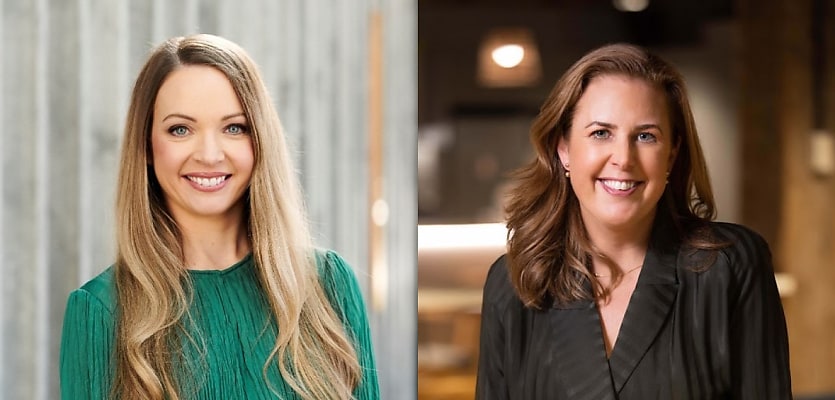For women in property, imposter syndrome is a familiar demon. Here’s how two women beat their fear of failure and learnt to own their ambition.
As the chief economist at Domain, Dr Nicola Powell is used to performing under pressure. Nevertheless, there are moments when Powell is standing before an audience of 200 people, ready to deliver the keynote presentation for a conference, when a shiver of anxiety sets in.
“It’s those moments when you puff your chest out and you’ve got to remind yourself that you are the expert in your field,” Powell said.
“If you’re continuing to tell yourself this, that you’ve got it, that no one wants to see you fail, it’s that real reminder to yourself that what you are doing is actually making a difference.”
Twenty years ago, Powell was a PhD candidate and research scientist in the small UK city of Norwich. Today, she has dedicated her life to making complex property data accessible to home buyers, real estate professionals and everyday people.
“A home is the Australian dream,” Powell said. “It’s a fundamental need. My role is making a difference in the landscape of real estate which touches every single Australian.”
Celebrating the wins
As someone who knows what it’s like to “wrestle with imposter syndrome”, Powell is deeply committed to advancing psychological safety within her team.
According to Powell, the most high-performing teams know how to celebrate their wins, but they also know how to “call out any mistakes” and are not afraid to fail.
Having a strong and honest team is a crucial security blanket in an industry that continues to pose barriers for women seeking to realise the top tier of success.
As the recent Workplace Gender Equality Agency (WGEA) report demonstrated, women in the real estate sector continue to earn over 25 per cent less than men and comprise just 34 per cent of upper quartile earners.
Rising to high-level positions in the property sector as a woman is no easy feat, but Powell insists that it’s a struggle worth undertaking.
“I think we all play role models for the next generation,” she said.
“I want to demonstrate to both my son and my daughter that there is no ceiling. I want to showcase that if you want to have a career and be a working mum, it is possible.”
Diversity is key
Alice Stolz, national property editor at Domain, is another leader who has built a strong platform for herself within the property industry.
Like many journalists, Stolz entered the Australian real estate sector with a few “holes in her knowledge” of property, but with a powerfully honed ability to connect with the public.
“I learnt on the go, and I’ve found that it often works to your advantage to have some spots where you’re not that sure,” Stolz shared.
“Sometimes in property people live in this space where they’re bathing in it all day, and we forget how to talk to everyday Aussies about what ultimately is the biggest decision in their life when it comes to where and how they live.”
Stolz’s experience has only deepened her conviction that diversity is key to the country’s housing future.
“People say, for example, ‘I don’t want to live in an apartment, I’ve got kids, I can’t do that,’ and you think, if we had more diversity and different backgrounds designing developments, we’ll have very different property types that will actually be in line with what people want, not necessarily what’s making someone a lot of money.”
“It’s what consumers want,” Stolz said.
Playing the long game
As Stolz noted, however, transforming the homogenous world of real estate will not just “happen through osmosis”, but requires long-term planning.
“There has to be serious succession planning in all businesses,” Stolz said. “There has to be a concerted effort and the cultivation of women and young talent in a business to really support that.”
And if young people are equipped with strong financial literacy skills from an early age, Stolz believes that the benefits of a gender-equal property landscape could spread beyond just the executive suite elite.
“This is not something that only affects the top 1 per cent,” Stolz said. “That education has to absolutely be dripped down to everybody.”
“We know that men own more houses than women,” she explained. “The more literacy and financial education we can give women about investing around property […] will really help erode that disparity we see in ownership over time.”
For women seeking to build a bright and bold career in property, Stolz’s most powerful piece of advice is to “build your own advisory board”.
Throughout her own career, she has learnt to treasure her own community of “people I know personally or professionally who will always help me stop, reflect and reevaluate myself – people to keep you honest, not people who will reflect back what they think you want to hear”.
And when moments of insecurity surface, it never hurts to try the time-true skill of imagining you are a “middle-aged white man”.
“One of the positives about property is we’re in a world where people are very smooth-talking and charismatic, and women can also be like that,” Stolz said.
“I think we should just embrace that, and not worry about the things we don’t have, the gaps, but just embrace who we are and do it with confidence.”








You are not authorised to post comments.
Comments will undergo moderation before they get published.